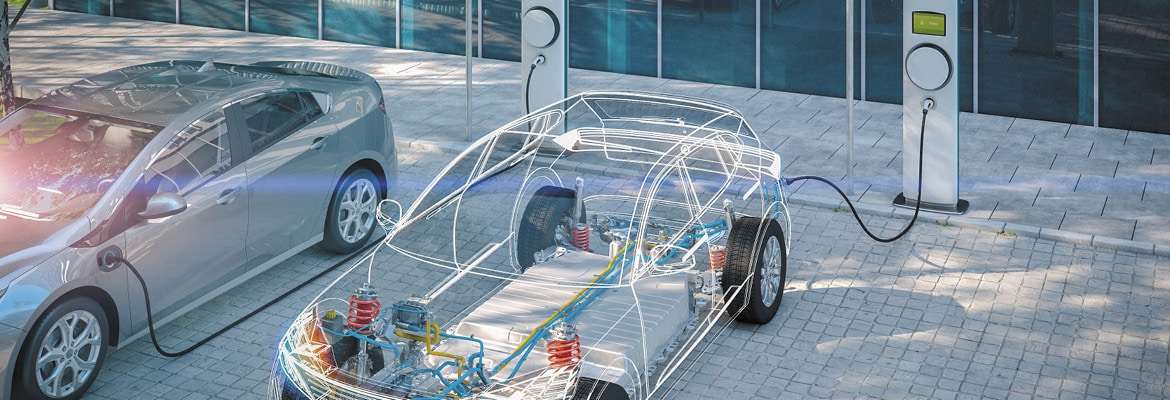Author(s)
- Q: What are the benefits of fleet electrification?
- Q: What are the different types of electric vehicles?
- Q: Are EVs actually cheaper to operate? Can they save my business money?
- Q. How should I measure an EV’s total cost of ownership?
- Q: How do I handle the infrastructure costs of an EV fleet?
- Q: Is transporting a fleet of EVs different from a fleet of ICE vehicles?
- Q: What is “range anxiety” and what do I need to know about EV ranges?
- Q. What information do drivers need to operate EVs in my fleet?
- Q: How else can I prepare for fleet electrification or start fleet electrification planning?
The conversations around EVs are supercharged, especially when it comes to the opportunities and obstacles around fleet electrification. With governments, manufacturers and businesses announcing plans to fight climate change, the pressure is on to meet lower—even zero—emissions targets. Major automakers such as Ford, General Motors, Volvo and Mercedes-Benz pledged to work toward selling only zero-emissions vehicles by 2040.
Fleet operators that are trying to stay ahead of the regulations, reduce their carbon footprints or save money are beginning to convert some of their vehicles to electric. The case for EV fleets grows stronger as additional incentives become available coupled with new restrictions on where internal combustion engine (ICE) vehicles can operate.
With new information comes a range of questions. This article answers common questions you may have as you conduct your own research into fleet electrification planning.
Q: What are the benefits of fleet electrification?
A: The main benefits of an electric fleet include reduced fuel and maintenance costs, lower emissions and enhanced vehicle performance. Since electricity prices are more stable, businesses will not have to plan for the volatility of fuel prices. Having EVs in your fleet also allows your company to become a more sustainable organization and operate within government-mandated low or zero-emission zones.
Q: What are the different types of electric vehicles?
A: There are several different categories of electric vehicles, including BEVs, HEVs, PHEVs and Fuel Cells.
- Battery Electric Vehicles (BEVs) are powered solely by an electric battery and do not have any gas engine parts.
- Hybrid Electric Vehicles (HEV) run on both an internal combustion engine and an electric motor. All energy comes from gasoline, no charging is needed.
- Plug-in Hybrid Electric Vehicles (PHEVs) expand on the HEV concept with a larger battery and electric motor. PHEVs do have a port for charging.
- The least common type of EV is the Hydrogen Electric Vehicle (Fuel Cell/FCEV). Only a few of these types of vehicles are sold in the U.S. and refueling stations are rare and primarily in California.
Q: Are EVs actually cheaper to operate? Can they save my business money?
A: Yes and yes. After conducting an EV suitability assessment, Geotab found that 64% of fleet cars would have a lower cost of ownership if replaced with battery electric or plug-in hybrid electric vehicles. According to Consumer Reports, EVs cost roughly $900 to maintain yearly compared to their counterparts, which cost about $1,200 each year.
Q. How should I measure an EV’s total cost of ownership?
A: Understanding the total cost of ownership (TCO) of electric vehicles in your fleet is essential in order to make the right financial decisions for your business. The U.S. Department of Energy offers a vehicle cost calculator to help calculate the cost of ownership for both EVs and gas-powered vehicles.
The largest expense will be the cost of acquiring the actual vehicles, which have a higher price tag than gas-powered vehicles. After accounting for that cost, business owners will see savings as it relates to the operation and maintenance of the EVs. On average, electricity is less expensive than gas, resulting in overall lower fuel costs during the life of EVs. With less maintenance than ICE vehicles, fleet owners should expect lower operating costs. Since charging equipment is considered a capital expense, it should not be considered in the TCO equation.
Q: How do I handle the infrastructure costs of an EV fleet?
A: This is a real concern for fleet electrification planning and could be the biggest obstacle for fleet owners. Multiple EVs may be able to charge using the same station and if you provide charging stations at employees’ homes, you may require less overall equipment.
More good news: There may be financial help. It’s worth investigating grants and incentives from the government as well as other national and state-level programs. Advanced Clean Tech News offers a list of programs and the Clean Cities Coalition and Electrification Coalition will help fleets navigate their options. Fleet operators can also turn to their utility companies for programs that will help fund the work needed.
Q: Is transporting a fleet of EVs different from a fleet of ICE vehicles?
A: Yes. There are several factors that affect the transportation of electric vehicles including weight, storage, weather and carrier expertise.
EVs weigh more than their gas-powered counterparts, which impacts transport capacity and cost. Since federal law mandates that carriers cannot haul more than 82,000 pounds of gross vehicle weight, the number of vehicles transported in one load may be reduced.
If the EVs need to be stored before transport, access to a “hub-and-spoke” style of storage system may be required. This is used when vehicles must be moved to a storage site but require charging before being loaded and transported to their final destination. Ideally, EVs should stay charged between 20 and 80 percent for transportation purposes.
The last two factors, weather and expertise, are also important. Both extreme cold and heat negatively affect the performance of lithium-ion batteries which may be important if storage is required. Truck drivers will also need to be trained on how to charge EVs as well as how to properly load and unload them. Find an auto logistics company with experience transporting EVs to ensure your vehicles are transported safely.
Q: What is “range anxiety” and what do I need to know about EV ranges?
Range anxiety is the worry that the vehicle won’t have enough charge to reach the destination. Fortunately, the latest models have impressive ranges, averaging between 200 and 300 miles on a single charge.
The following EV models have an estimated range of over 200 miles:
Audi e-tron: 226 miles
Chevrolet Bolt: 259 miles
Ford F-150 Lightning: 230 miles
Hyundai Kona Electric: 258 miles
Hyundai Ioniq 5: 303
Kia Niro: 285
Nissan Leaf: 212
Tesla Model 3: 358
To get the best mileage possible maintain proper tire pressure, especially as temperatures change.
Q. What information do drivers need to operate EVs in my fleet?
A. While drivers will not need to learn new skills, there are some differences to note. Many electric car manufacturers utilize advanced technologies to operate their vehicles which may be confusing. Drivers will also need to get comfortable with the increased torque and follow good driving practices such as adhering to speed limits and avoiding harsh acceleration or braking as it will improve energy efficiency.
Be sure drivers know how to charge their EVs and educate them on the types of charging stations available on the road. Also, share how hot or cold weather can impact range and cabin temperature. A best practice is to preheat or precool the vehicle while it’s still plugged in so that energy can be used for driving.
Q: How else can I prepare for fleet electrification or start fleet electrification planning?
Electrifying your fleet may seem like an overwhelming process. There are many resources to support your research and help you get started.
The Vehicle Technologies Office lists several programs and tools for fleet managers as does the U.S. Environmental Protection Agency. The Electrification Coalition works to advance electric mobility and drive economies of scale and is a good source of information. If your fleet consists of class 3-8 vehicles the Environmental Defense Fund recently released a free online resource to help fleet managers navigate the complexities of truck electrification.

A partner for proven fleet transportation
A key component of a successful fleet management operation is automotive logistics. Montway Auto Transport can add speed and reliability to your auto remarketing with our proven capabilities. We have experience transporting EVs and closely monitor transport regulations to ensure our carrier network has the knowledge and equipment needed to properly handle the loading, transport and delivery of electric and hybrid vehicles anywhere in the country. To learn more, visit our website, call 888-997-8993 or email Logistics@Montway.com for more information about our fleet transportation services.








